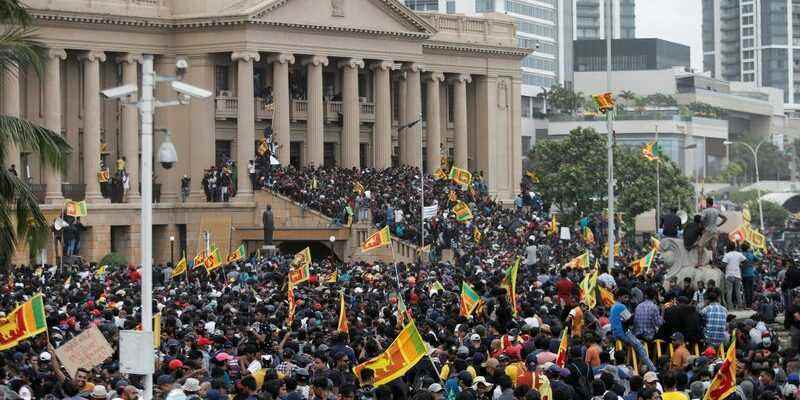COLOMBO (Reuters) – Sri Lanka’s Prime Minister Ranil Wickremesinghe is set to step down to make way for a national unity government, his team said in a statement on Saturday, after thousands of protesters stormed the presidential residence Colombo, the economic capital of the country.
Overwhelmed by the scale of the situation, the soldiers and the police mobilized could not hold back the crowd of demonstrators, who demand the resignation of President Gotabaya Rajapaksa as the economic crisis increases on the island of 22 million people. ‘inhabitants.
For safety, the Head of State was evacuated from his official residence on Friday in anticipation of the anti-government rally scheduled for this weekend, two sources from the Ministry of Defense announced.
Several people also forced the doors of the presidential secretariat and penetrated into the Ministry of Finance.
Ranil Wickremesinghe – who was also placed in a safe place according to a government source – met with the leaders of several political parties, summoned urgently, to decide on the measures to be taken.
“(Ranil) Wickremesinghe has told party leaders that he is ready to step down as prime minister and make way for a multiparty government,” his office said in a statement.
“The president and the prime minister must resign immediately. Otherwise, the political instability will worsen,” the leader of Sri Lanka’s Freedom Party and former president Maithripala Sirisena earlier said.
ECONOMIC CRISIS
A video broadcast live on Facebook showed hundreds of demonstrators, some draped in the national flag, massing in the various rooms of the presidential palace, others strolling around the residence.
At least 39 people, including two police officers, were injured and hospitalized during the protests, hospital sources told Reuters.
Short of foreign currency due to economic mismanagement and the impact of the coronavirus crisis, Sri Lanka has struggled to import even essentials, causing severe shortages of medicine, food and fuel .
Many Sri Lankans blame the country’s decline on President Gotabaya Rajapaksa, whose departure they want.
Inflation reached a record rate of 54.6% over one year in June and could reach 70% in the coming months.
The economy of the island of 22 million inhabitants, based on tourism, has also been strongly affected by the COVID-19 crisis.
Political instability could jeopardize discussions with the International Monetary Fund with a view to obtaining aid worth 3 billion dollars and the restructuring of part of the country’s foreign debt.
Sampath Perera, a 37-year-old fisherman, said he took a packed bus from the seaside town of Negombo, 45 km north of Colombo, to join the protest.
“We said over and over to Gota (Rajapaksa) to go home but he still clings to power. We won’t stop until he listens to us,” he said.
(Report Uditha Jayasinghe, Devjyot Ghoshal, French version Laetitia Volga)
by Uditha Jayasinghe
